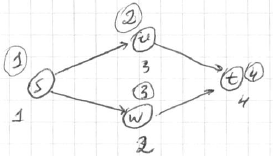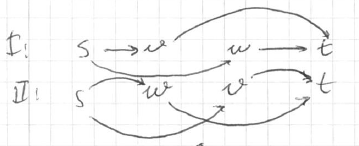Topological Ordering
A ‘‘topological ordering’’ for a directed graph $G$ is a labelling $f$ of $G$’s nodes such that
- the $f(v)$’s are the set ${1, 2, …, n}$
- $(u, v) \in G$ => $f(u) < f(v)$
- all edges go forward
Example:
- graph <img src=”
 ” >
” > - possible orderings <img src=”
 ” >
” >
Motivation:
- sequence tasks while respecting all constains
- courses at uni with prerequisites
Straightforward solution
- every directed graph has a ‘‘sink’’ vertex <img src=”
 ” >
” > - compute backwards, finding a sink on each iteration
Idea:
- let $v$ be sink of $G$
- set $f(v) = n$
- recurse on $G - {v}$
But it can be computed using Depth-First Search very quickly
DFS solution
- dfs finds a sink
- and unfolds backwards numerating the vertices
Consists of 2 routines: DFS-loop and DFS
DFS-loop(graph $G$):
- mark all vertices not explored
- current label = $n$
- for each vertex $v$
- if $v$ not explored
- DFS($G$, $v$)
DFS(graph $G$, vertex $s$):
- for every edge $(s, v)$
- if $v$ not explored
- mark $v$ explored
- DFS($G$, $v$)
- set $f(s)$ = current label
- current label = current label - 1
Cycles
if $G$ has a [directed] cycle, it has no topological ordering. It is possible to modify the algorithm so it will inform about cycles.
Idea: instead of marking the vertices as explored, mark them with two colors:
- one color means “the vertex is being processed”
- another color means “the vertex has been processed”
Modifications:
- check if vertex $s$ is already ‘‘being proceed’’ - and if so, report a cycle
- mark the vertex as ‘‘being processed’’
- proceed as usually
- before leaving the routine, mark the vertex as ‘‘done’’
Implementation
public class TopologicalOrdering {
private final List<String> vertices;
private final Graph graph;
private final Map<String, Status> visitedVertices;
private final List<String> result = Lists.newLinkedList();
// some initialization
private static enum Status {
STARTED, DONE;
}
public List<Rule> run() {
for (String vertex : vertices) {
if (| visitedVertices.containsKey(vertex)) { | dfs(graph, vertex); | }
}
return result;
}
private void dfs(Graph graph, String vertex) {
Status status = visitedVertices.get(vertex);
if (status == Status.STARTED) {
throw new IllegalStateException("Look ma I got a cycle| "); | } |
if (status == Status.DONE) {
return;
}
visitedVertices.put(vertex, Status.STARTED);
for (String to : graph.adjacent(vertex)) {
dfs(graph, to);
}
visitedVertices.put(vertex, Status.DONE);
result.add(vertex);
}
}
See also
Sources
- Algorithms Design and Analysis Part 1 (coursera)
- http://en.wikipedia.org/wiki/Topological_sorting